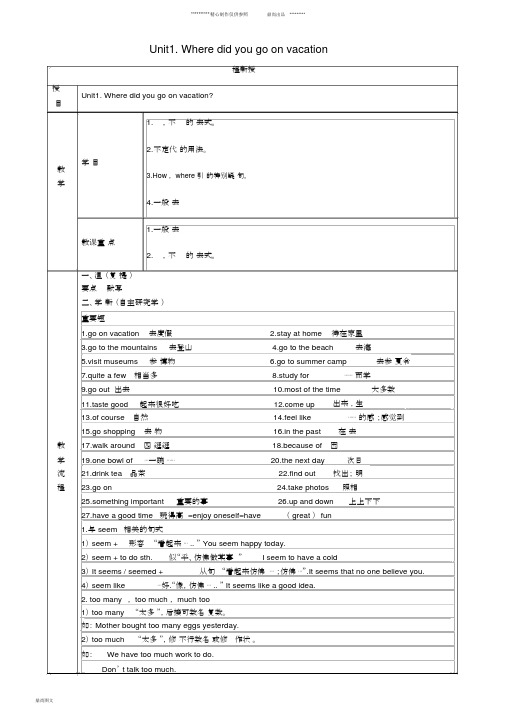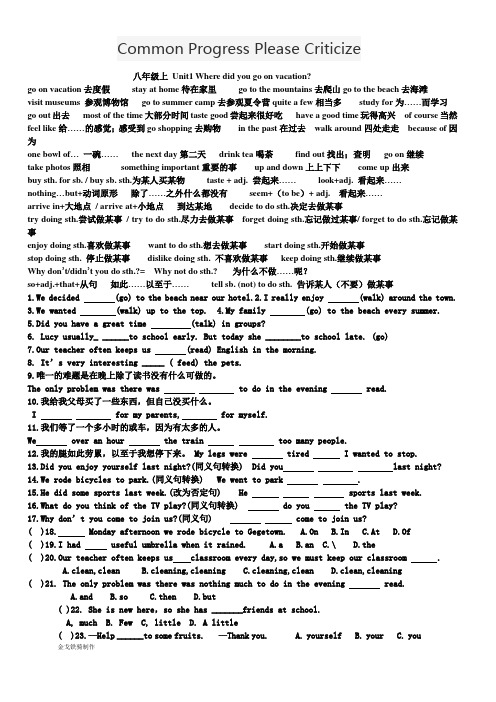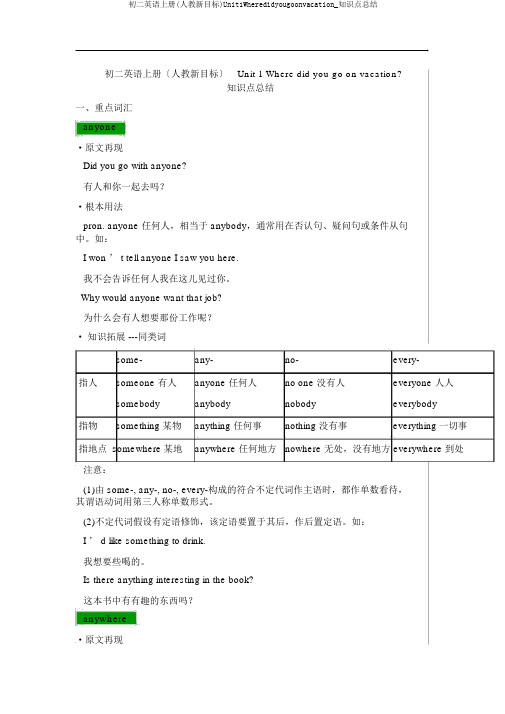原八年级英语上册Unit1WheredidyougoonvacationSectionB(3aselfcheck)课件(新版)人教新目标版
八年级英语上册Unit1Wheredidyougoonvacation讲义+习题(新版)人教新目标版

Unit1. Where did you go on vacation程新授授Unit1. Where did you go on vacation?目1.,不的去式。
2.不定代的用法。
学目教3.How , where 引的特别疑句。
学4.一般去1.一般去教课重点2.,不的去式。
一、温(复提)要点默写二、学新(自主研究学)重要短1.go on vacation去度假2.stay at home待在家里3.go to the mountains去登山4.go to the beach去海5.visit museums参博物6.go to summer camp去参夏令7.quite a few相当多8.study for⋯⋯ 而学9.go out 出去10.most of the time大多数11.taste good起来很好吃e up出来 ,生13.of course自然14.feel like⋯⋯的感;感觉到15.go shopping去物16.in the past在去教17.walk around四逛逛18.because of因学19.one bowl of⋯一碗⋯⋯20.the next day次日流21.drink tea品茶22.find out找出;明程23.go on24.take photos照相25.something important重要的事26.up and down上上下下27.have a good time 玩得高 =enjoy oneself=have( great ) fun1.与 seem相关的句式1) seem +形容“看起来⋯ .. ” You seem happy today.2) seem + to do sth.似“乎、仿佛做某事”I seem to have a cold3) It seems / seemed +从句“看起来仿佛⋯;仿佛⋯”.It seems that no one believe you.4) seem like⋯好.“像,仿佛⋯ .. ” It seems like a good idea.2. too many, too much , much too1) too many“太多”,后接可数名复数。
英语八年级上册Unit1Wheredidyougoonvacation[八上unit1-]
![英语八年级上册Unit1Wheredidyougoonvacation[八上unit1-]](https://img.taocdn.com/s3/m/42377ea7b8d528ea81c758f5f61fb7360b4c2bf1.png)
Hale Waihona Puke 3a Fill in the blanks with the words in the box and practice
the conversation.
anyone, something, anything, everything , nothing
Linda: Did you do _a_n_y_t_h_in_g_ fun on your vacation, Alice? Alice: yes, I did. I went to Sanya. Linda: How did you like it? Alice: Well, it was my first time there. So _e_v_e_r_y_th__in_g_ was
事某一体育活动或休闲活动。
go bike riding 骑自行车旅行 go climbing去爬山
go skating去滑冰
go hiking去远足
go sightseeing去观光
go fishing去钓鱼
go swimming去游泳
go camping去野营
go boating去划船
go surfing去冲浪
(2) somebody/someone/something一般用于肯定句,
而anybody/anyone/anything一般用于否定句、疑问句或条 件状语从句。 例:某人正在唱歌。 Someone /Somebody is singing a song.
我们现在不能作出任何决定。 We can’t decide anything now. 你要是需要什么,请给我打电话。 If you want anything, please call me.
人教版英语八年级上册Unit1WheredidyougoonvacationSectio

人教版英语八年级上册Unit1Where did you go on vacation Section A1a-2c教案Where did you go on vacation?Section A1a-2c 教案学习目标: 1、学会商论自己的假期。
2、记着规则动词和不规则动词的过去式。
学习要点:会用过去式讨论自己的假期。
学习难点:动词过去式的变化规则。
学习过程:一、情境导入 (Warm up)度过了一个快乐的暑期,同学们在这个暑期时期都有些什么收获呢?去了哪里玩?和谁在一块儿?吃了些什么美味的东西?请同学们相互沟通一下。
二、引入新课(New lesson)1、学习 1a 中的词组,并能认识其汉语意思。
2、达成 1a.3、学习新句型。
A:Where did you go on vacation?B: I went to the mountains.4、 Practice.运用 1a 中的词组进行对话练习,也可自由描绘一下自已的假期。
三、听力训练。
1、听录音,达成1b.2、率领学生熟习2a、 2b 的听力题目,认识对话大体内容。
3、听录音,独立达成2a、 2b.4、查对答案。
四、对话训练。
( Pairwork )1、 1c. Make conversations about the people in 1a.A:Where did Tina go on vacation?B:She went to the mountains.2、 2c. Role-play conversations between Grace. Kevin and Julie.A: Grace, Where did you go on vacation?B: I went to New York City.A:Oh, really? Did you go with anyone?B:Yes, I went with my mother.3、 Practice like 2d.五、语法角 .Where did you go on vacation?How was the food?Did you go out with anyone?第一单元的要点语法是要修业生会咨询过去式的特别疑问句和一般疑问句,并能对其作正确回答,在此基础上,要修业生应掌握一些常用的动词的过去式。
人教版英语八年级上第一单元Unit1Wheredidyougoonvacation知识点梳理

人教版英语八年级上第一单元Unit1Wheredidyougoonvacation知识点梳理Unit 1 Where did you go on vacation?知识梳理一、词型转换Section A1.wonder →(adj.) wonderful2.I →(反身代词) myself3.you →(反身代词) yourself4.yourself →(pl.) yourselves5.seem →(pt.) seemedSection B1.activity →(pl.) activities2.decide →(n.) decision3.try →(pt.) tried4.bike →(同义词) bicycle5.build →(n.) building6.difference →(adj.) different7.like →(反义词) dislike8.below →(反义词) above二、短语归纳Section A1.go to Central Park 去中央公园2.on vacation 在度假3.buy something special 买特别的东西4.meet someone interesing 遇见有趣的人5.go out with someone 和某人一起出去6.take quite a few photos 拍相当多的照片7.most of the time 大多数时间8.go shopping 去购物9.keep a diary 记日记10.of course 当然;自然Section B1.have a good time 玩得高兴;过得愉快2.go to the beach 去海滩3.feel like 感觉像4.the houses of the Chinese traders 中国商人的房子5. a lot of new buildings 许多新的建筑物6.in the past 在过去7.over an hour 一个多小时8.too many people 太多的人9.get to the top 到达顶部10.because of the bad weather 因为不好的天气11.one bowl of fish 一碗鱼肉12.another two hours 另外两个小时13.the top of the hill 山顶14.learn something important 学习重要的东西Self Check1.go to the countryside 去乡下2.in the shopping center 在购物中心3.have a fun time 玩得高兴;过得愉快4.after three hours 三个小时以后5.keep going 一直走6.twenty minutes later 20分钟后重点句子1.Where did you go on vacation?你去哪儿度假的?2.Long time no see.好久不见。
人教版英语八年级上册Unit1Wheredidyougoonvacation

八年级上Unit1 Where did you go on vacation?go on vacation去度假stay at home待在家里go to the mountains去爬山go to the beach去海滩visit museums 参观博物馆go to summer camp去参观夏令营quite a few相当多study for为……而学习go out出去most of the time大部分时间taste good尝起来很好吃have a good time玩得高兴of course当然feel like给……的感觉;感受到go shopping去购物in the past在过去walk around四处走走because of因为one bowl of…一碗……the next day第二天drink tea喝茶find out找出;查明go on继续take photos照相something important重要的事up and down上上下下come up出来buy sth. for sb. / buy sb. sth.为某人买某物taste + adj. 尝起来……look+adj. 看起来……nothing…but+动词原形除了……之外什么都没有seem+(to be)+ adj. 看起来……arrive in+大地点/ arrive at+小地点到达某地decide to do sth.决定去做某事try doing sth.尝试做某事/ try to do sth.尽力去做某事forget doing sth.忘记做过某事/ forget to do sth.忘记做某事enjoy doing sth.喜欢做某事want to do sth.想去做某事start doing sth.开始做某事stop doing sth. 停止做某事dislike doing sth. 不喜欢做某事keep doing sth.继续做某事Why don’t/didn’t you do sth.?= Why not do sth.? 为什么不做……呢?so+adj.+that+从句如此……以至于……tell sb. (not) to do sth. 告诉某人(不要)做某事1.We decided (go) to the beach near our hotel.2.I really enjoy (walk) around the town.3.We wanted (walk) up to the top.4.My family (go) to the beach every summer.5.Did you have a great time (talk) in groups?6. Lucy usually_ ______to school early. But today she ________to school late. (go)7.Our teacher often keeps us (read) English in the morning.8. It’s very interesting _____ ( feed) the pets.9.唯一的难题是在晚上除了读书没有什么可做的。
八年级英语上册Unit1Wheredidyougoonvacationperiod3教案人教新目标版

Unit1 Where did you go on vacation?听说课Section B(1a-1e)第三课时Learning Goals1. Get the students to talk about holidays and vacations using “ Where did you go on vacation ? I went to ….。
Did you go ….with anyone?.。
.No。
. Yes… How was the food?.。
Everything ….”2。
Get the students to….(尽可能用一句话精确表述本节课的知识、能力和情感目标。
)Preview一、Look at p4 put the following into English orally,then write them down without looking at the text.1. -——---Lisa去哪儿度假了?—————-她去了香港。
2。
她在那儿做什么特别的事了吗?3。
她给她的好朋友买什么了吗?4. 关于她的假期,Lisa怎么说?(通过检查预习短语和句型,了解学生对课本课知识的掌握情况,为下一步的教学做好准备。
) Step1 Warming up and leading in热身导入T: Now we’re having an English class。
What do you think of English?S1: I think of it's interesting.。
S2: I think it’s easy。
S3: …T: You see, these students use so many adjectives to describe English。
Some adjectives are positive such as interesting, easy,…。
初二英语上册(人教新目标)Unit1Wheredidyougoonvacation_知识点总结

初二英语上册〔人教新目标〕Unit 1 Where did you go on vacation?知识点总结一、重点词汇anyone·原文再现Did you go with anyone?有人和你一起去吗?·根本用法pron. anyone 任何人,相当于 anybody,通常用在否认句、疑问句或条件从句中。
如:I won ’ t tell anyone I saw you here.我不会告诉任何人我在这儿见过你。
Why would anyone want that job?为什么会有人想要那份工作呢?·知识拓展 ---同类词some-any-no-every-指人someone 有人anyone 任何人no one 没有人everyone 人人somebody anybody nobody everybody指物something 某物anything 任何事nothing 没有事everything 一切事指地点 somewhere某地anywhere 任何地方nowhere 无处,没有地方 everywhere 到处注意:(1)由 some-, any-, no-, every-构成的符合不定代词作主语时,都作单数看待,其谓语动词用第三人称单数形式。
(2)不定代词假设有定语修饰,该定语要置于其后,作后置定语。
如:I ’ d like something to drink.我想要些喝的。
Is there anything interesting in the book?这本书中有有趣的东西吗?anywhere·原文再现Oh,did you go anywhere interesting?哦,你去过某个有趣的地方吗?·根本用法adv./pron. anywhere 什么地方,任何地方,常用在否认句或疑问句中。
肯定句中常用 somewhere,其修饰词也常常放在其后面。
八年级英语上Unit 1 Where did you go on vacation

Unit 1 Where did you go on vacation?知识目标:1.复合不定代词2.一般过去时的规则动词与不规则动词Section AStep 1 . Words Expression1. vacation n. 假期;休假【常用搭配】on vacation 在度假;在假期中go on vacation 去度假take a vacation at/in 在....度假【辨析】holiday & vacation两者都指工作日以外的休息时间,但不包括周末或仅仅一天的休息日;holiday 多用于英式英语;vacation 多用于美式英语。
2. anyone pron. 肯定句意为“任何人”;否定和疑问句意为“有人”anyone不定代词,相当于anybody. 做主语时,谓语动词用单数形式。
反义词someone = somebody 用于肯定句中。
【辨析】anyone& any one【中考链接】--- Can you cook eggs with tomatoes?--- Yes, of course. A can do it, because it is easy, I think.A. AnyoneB. SomeoneC. No oneD. None of us3. everyone pron. 每人;人人;所有人,相当于everybody。
作主语时,谓语动词用单数形式。
Everyone in our class likes Mr.Liu. 我们班的每个人都喜欢刘老师。
【辨析】everyone & every oneeveryone 只用来指人,等同于everybody,其后不可接介词of;every one是两个词,既可指人,也可以指物,后面可跟介词of。
4. most adj. 最多的,大多数的adv. 最;最多;最大程度地pron. 最多;大多数【用法点拨】most of........做主语时,谓语动词的单复数取决于of 后的名词,of 后的名词是复数则谓语动词用复数形式,否则用单数形式。
- 1、下载文档前请自行甄别文档内容的完整性,平台不提供额外的编辑、内容补充、找答案等附加服务。
- 2、"仅部分预览"的文档,不可在线预览部分如存在完整性等问题,可反馈申请退款(可完整预览的文档不适用该条件!)。
- 3、如文档侵犯您的权益,请联系客服反馈,我们会尽快为您处理(人工客服工作时间:9:00-18:30)。
August
hot and sunny
Tian'anmen Square
beautiful and interesting took some photos I can learn something important from it
Beijing duck
delicious
tired
Answer the questiona to make notes about
3b a vacation you took.
Write a travel diary like Jane's on page 5.
3c Use your notes in 3b.
_____________________________________________T_u_e_sd_a_y_,_J_u_ly__2_8_th_ _____T_o_d_ay__th_e__w_e_a_th_e_r_w__as__v_er_y_s_u_n_n_y_._I_w_e_n_t _to__Q_i_n_gd_a_o__w_i_th__m_y_f_a_m_i_ly_._I_ _w_e_n_t_t_o_t_h_e_b_e_a_ch_._T__h_er_e_w__er_e_m__a_n_y_p_e_o_p_le__th_e_r_e_. _S_om__e_p_e_o_p_le__sw__a_m__in_t_h_e_ _s_e_a,_s_o_m_e__la_y_o_n__th_e__b_ea_c_h_t_o_e_n_jo_y__th_e__su_n_s_h_in_e_._I_f_o_u_n_d_m__a_n_y_b_e_a_u_ti_fu_l____ _s_h_e_ll_s _o_n_t_h_e_b_e_a_ch__w_i_th__m_y__si_st_e_r._I__li_k_ed__th_e_m__v_e_r_y_m_u_c_h_._I_a_t_e_s_o_m_e_s_e_a___ _f_o_od_._I_t_h_i_n_k_i_t _w_a_s_a_w_f_u_l._B_u_t_m__y_f_a_th_e_r_s_a_id__it_w__a_s_v_e_ry__d_el_ic_i_o_u_s._W__e_____ _s_ta_y_e_d_t_h_e_r_e_fo_r__a_w_e_e_k_. _I_w_a_s_h_a_p_p_y_t_o_s_t_a_y_t_h_er_e_.____________________
2. so... that ...的用法 1)天气如此晴朗以至于我想去游泳。It's so sunny that I want to swim. 2)他跑的如此快以至于我不能追上他。 He runs so quickly that I can't catch up with him.
B. to work
C. working
4. The students stood up and clapped in ______________ (excited).
excitement
1. look for, find 和 find out 的区别 1)他在找他的鞋子。He is looking for his shoes. 2) 他没找到他的自行车。He didn't find his bikes. 3)读这篇文章,找出这个问题的答案。
Unit 1 Where did you go on vacation?
Section B (3a—self check)
Complete the diary entry about a trip to one of these place.
3a Use the words and prases in the box to help you.
4
Questions: Where did you go? How was the weather? What food did you eat? How did you feel about the trip? ... ... ... ...
Did you go with anyone? What did you do every day? What dod you like best?
A. look for
B. find
C. find out
( ) 2. The girl is _____ lovely that we all like her.
B
A. too
B. so
C. very
( ) 3. After a short break, we keep _____.
C
A. work
1. Complete the ቤተ መጻሕፍቲ ባይዱonversations with the correct words in the box.
anything everything nothing anyone everyone no one
anyone
No one Nothing
anything Everything
Read this passages, and find out the answer to the question. look for, find 和 find out 都含有“ 寻找、找到 ” 的意思,但其含 义和用法却不想他。 look for 意为“ 寻找 ”,是有目的的找, 强调“ 寻找 ”这一动作。 find 意为“ 找到,发现”,通常指找到活发现具体的东西,也可指 偶然发现某物或某事,强调的是找的结果。 find out 意为“ 找出、发现、查明 ”,多指通过调查、询问、打听、 研究之后“ 搞明白、弄清楚 ”,通常含有“ 经过困难曲折 ”的含义, 指找出较难找到的、无形的、抽象的东西。
Everyone
2. Complete the passage with the correct forms of the verbs in brackets.
did went
went jumped
started forgot
found were
told
started took
weren't
( C ) 1. Can you _____ who broke the window?
